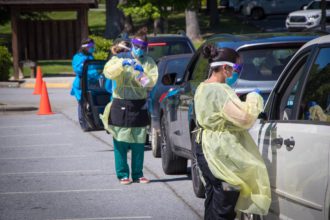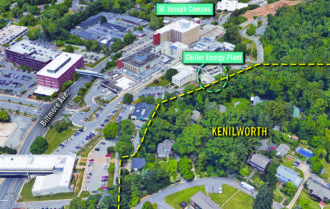The rally was part of a push from the union to pressure HCA, a for-profit that purchased Mission in 2019, for better working conditions. The event was the latest in a long line of actions by local and state officials against the company.


The rally was part of a push from the union to pressure HCA, a for-profit that purchased Mission in 2019, for better working conditions. The event was the latest in a long line of actions by local and state officials against the company.

HCA declined repeated requests for the number of doctors who have left the Mission system since it took over in February 2019 and refuses to say how many doctors are on staff today, other than that the number is “relatively the same.” But Asheville Watchdog identified 223 doctors who appear to be no longer practicing there.

A 2018 memo, obtained via a public records request from the N.C. Attorney General’s office, says the “deck had been stacked” in favor of selling Mission Health to HCA by then-CEO Dr. Ronald A. Paulus.

According to a new report by the nonprofit Patient Rights Advocate, only 4 out of 21 hospitals reviewed in North Carolina followed federal price transparency rules in 2021. The organization randomly checked 500 hospitals across the nation. State Treasurer Dale Folwell is calling for federal and state officials to enforce the rules.

Amid internal upheaval following the sudden departure of CEO Antony Chiang, the COVID-19 pandemic and economic uncertainty, the $1.5 billion foundation held its first annual meeting virtually on Oct. 28. Highlights included funding updates and a discussion about organizational transparency.

According to the Opportunity Insights Economic Tracker, the employment rate among Buncombe County workers making $27,000 or less per year was 30.2% lower in mid-September than at the start of 2020. By comparison, jobs making over $60,000 annually were down just 3.4% on the year.

According to a new study by Filterbuy, an air filter industry website, the median air quality index in the Asheville metropolitan area was 15.3% better over the period from 2015-2019 compared with the period from 2005-2009. The Hickory-Lenoir-Morganton and Greenville, S.C., metros also showed big improvements.

The news stunned Asheville and Western North Carolina, where Mission Health System Inc. was the area’s largest employer, its main healthcare provider, and a long-time source of civic pride. Seemingly out of the blue, Mission’s directors publicly announced on March 21, 2018, that they had voted to sell the 133-year-old nonprofit to HCA Healthcare.

Less than a year after Antony Chiang arrived in Asheville to lead the newly formed Dogwood Health Trust, he’s left the foundation — and despite repeated attempts, Xpress has yet to learn why.

As Mission Health begins to reopen for elective surgeries and procedures put on hold during the first wave of the ongoing pandemic, the unresolved question that roiled the community just three months ago remains: Was HCA’s purchase of Mission Health healthy for Asheville?

Although multiple trucks of supplies from the Strategic National Stockpile have been delivered to other parts of North Carolina by the National Guard over the past week, according to state Director of Emergency Management Mike Sprayberry, county officials say they aren’t aware of any such deliveries to local health care workers.

On March 17, the county announced that it would combine its Soil and Water Conservation District with N.C. Cooperative Extension to form the Agriculture and Land Resources Department. Meanwhile, the managers of numerous area parks and trails have opted to restrict access in an effort to slow the spread of COVID-19.

Announced at the N.C. Press Association’s annual banquet in Raleigh on Feb. 27, Xpress’ wins also included a second-place finish in the General Excellence category for the state’s largest community newspapers and individual awards for five staff members.

Gibbins Advisors, the independent monitor charged with validating HCA Healthcare’s compliance with the promises it made when it acquired Asheville-based Mission Health nearly a year ago, is taking its efforts public in a big way.

Nine months after the merger took effect, the public still has no idea whether a monitor has been chosen, what the firm’s name is, when it will start work and – importantly – who’s been minding the store to keep HCA and Mission Health accountable in the interim.

James Baumstark, deputy chief of the Asheville Police Department, declared that all of the backlogged kits in his department’s possession had been reviewed — nearly 600 in all — with 414 already sent in for testing. Buncombe County Sheriff Quentin Miller also said that his office was evaluating and prioritizing a backlog of 201 untested kits.

Josh Stein announced that his office had developed a new agreement after months of “extensive negotiations” involving Mission, HCA and the Dogwood Health Trust. He explained that the changes would strengthen HCA’s community commitments, make the DHT board more representative of its service area and ensure greater accountability for both organizations.

“There’s real fear among nonprofit organizations that not supporting the current iteration of the board could mean retaliation in the form of being cut from the $1.5 billion that DHT will control once the sale is final,” wrote Asheville-Buncombe NAACP President Carmen Ramos-Kennedy. “In order to truly build trust, citizens and organizations must feel free to speak their hearts and minds without fear.”

As demand for solar energy increases, members of the N.C. Sustainable Energy Association worry that negative word-of-mouth about experiences with renewables could undermine trust in established installers. In August, the trade group developed a “Solar Business Code” establishing fundamental professional standards.

Earlier this summer, Kenilworth residents followed up on a complaint first sent to the city of Asheville in September 2017. They allege that changes Mission has made to address their noise concerns haven’t eliminated the problem — and that the health system wasn’t acting in good faith when it entered into discussions with the community.

State Attorney General Josh Stein visited Asheville on June 6 to discuss the region’s efforts to combat the far-reaching effects of the opioid crisis. While not alone among North Carolina counties in dealing with drug abuse, overdoses and drug-related deaths, Buncombe County’s problem is significant, local representatives and Stein said.